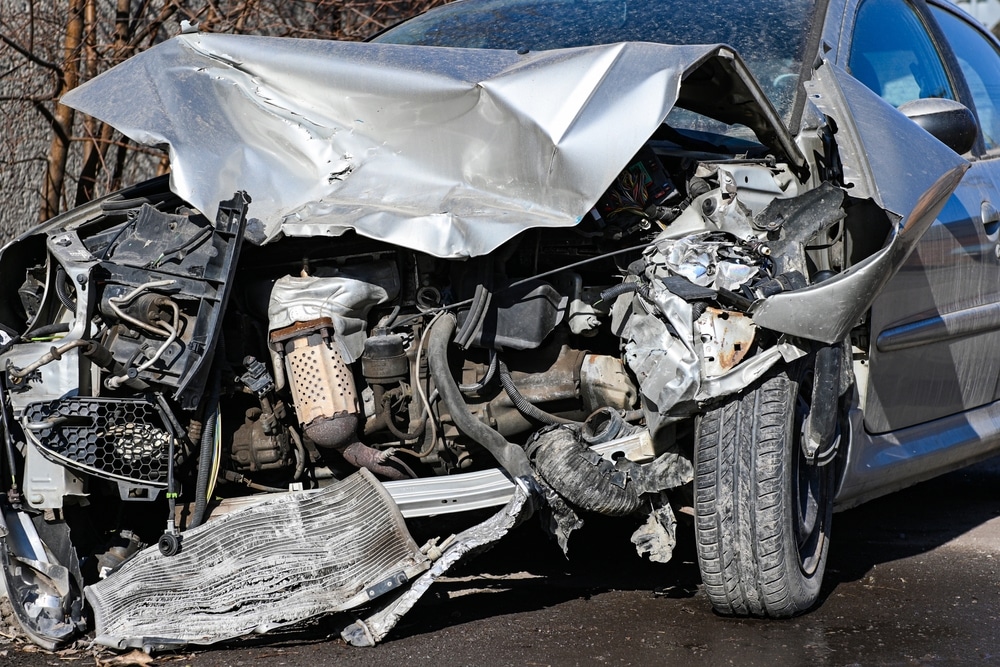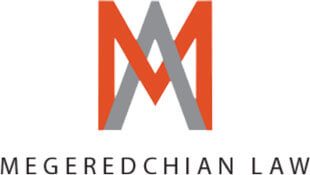
Receiving an insurance low ball offer on a totaled car is both common and frustrating. The good news? Saying “no” is not only entirely possible — it’s often expected. The first settlement offer from an insurance company is usually just the starting point of a negotiation. You have time to gather evidence, research the market, and prepare a counter-offer that better reflects your vehicle’s actual value. You can learn how to do that in this original article by Megeredchian Law.
Before diving into the specifics, it’s also worth noting that working with experienced car accident lawyers in California can give you a significant advantage when it comes to challenging a low-ball offer — especially in total loss claims. If you’re already in this situation and want to respond quickly and effectively, call Megeredchian Law at (866) 359-0807. Schedule a free consultation and speak directly with an attorney.
Do You Have to Hire a Lawyer If You Received an Insurance Low Ball Offer on a Totaled Car?
No, California law does not require you to hire a lawyer to dispute a low ball insurance offer on a totaled car — but doing so is often in your best interest.
Insurance companies in California must follow specific rules under the Fair Claims Settlement Practices Regulations (Title 10, CCR §2695.7). These rules require insurers to conduct a fair vehicle valuation and provide a reasonable explanation for their settlement amount. If their offer appears far below market value or lacks documentation, you have the right to challenge it — either on your own or with legal support.
In California, legal support helps level the playing field against insurance companies that are trained to protect their bottom line. In many cases, hiring an attorney improves your odds of a better payout, especially when:
- The insurance company refuses to negotiate or delays payment.
- The total loss valuation excludes key factors like upgrades, registration fees, or local market pricing.
- You suspect bad faith tactics or outright denial of a valid claim.
- You’re recovering from injuries at the same time and cannot dedicate time to build a counter-offer.
Attorneys experienced in California insurance disputes know how to:
- Demand a full valuation breakdown from the insurer.
- Compare valuations using Kelley Blue Book, Edmunds, and local listings.
- Write effective demand letters.
- Negotiate with adjusters using supporting evidence.
- Escalate to California’s Department of Insurance if the claim is unfairly denied or delayed.
Here are some related articles you might find interesting:
Can You Sue an Insurance Company? 5 Accident Scenarios
Low-Ball State Farm Settlement Offer? Know Their Tactics
How Long Do You Have to Make a Counteroffer?
In California, there’s no strict legal deadline for making a counteroffer after receiving a low settlement offer for a totaled car.
However, insurance companies often impose internal deadlines—typically giving you 7 to 10 business days to respond—before they consider closing the file or finalizing the offer. While these timelines aren’t legally binding, failing to respond in a timely manner can weaken your position or signal passive acceptance. An experienced attorney can step in immediately to manage this communication, request extensions if needed, and ensure that your response is submitted within the insurer’s window while preserving your negotiation leverage.
A lawyer can also help you build a compelling counteroffer backed by evidence, such as market value research, repair estimates, or comparable vehicle listings. They know how to challenge insurance company valuation methods and prevent unfair claim closures due to procedural missteps or delays.
Additionally, attorneys can track all statutory deadlines related to the claim itself—such as California’s 40-day rule for accepting or denying a claim—and hold the insurer accountable if they’re stalling or operating in bad faith. Their involvement can be especially valuable when the insurer tries to pressure you into accepting an inadequate offer quickly.
The California Total Loss Law, and How to Use It to Your Advantage
What Is the California Total Loss Law?
Under California law, when your car is damaged in an accident, your insurance company must determine whether it’s more cost-effective to repair the vehicle or declare it a total loss and pay you its actual cash value (ACV) before the crash. This evaluation process is governed by regulations including the Fair Claims Settlement Practices Regulations (California Code of Regulations §2695.8) and Vehicle Code §11515. These laws are designed to ensure that insurers treat policyholders fairly and provide accurate valuations.
To make this determination, the insurer will assess several key factors:
- Actual Cash Value (ACV): What your car was worth immediately before the accident. This is based on the vehicle’s age, mileage, condition, options, and local market comparisons.
- Repair Costs: The total cost required to bring the car back to safe, working condition using parts and labor.
- Salvage Value: What the insurer could recover by selling the damaged car for parts or scrap.
If the repair cost plus salvage value equals or exceeds the vehicle’s ACV, the insurer will usually declare it a total loss. This is sometimes referred to as the Total Loss Formula (TLF), though California does not enforce a strict numerical threshold like some other states. Instead, insurers follow internal guidelines, which must still comply with the state’s fair claims standards.
How You Can Use This Law to Push Back Against a Low Ball Offer
California’s regulations give drivers specific rights — and you can use these to challenge an insurance company’s low-ball settlement on a totaled vehicle.
First, you have the right to demand a detailed explanation of how the insurer calculated your vehicle’s ACV. They must provide documentation, including the sources and comparable vehicles used to justify the amount. If they undervalue your vehicle by ignoring options, upgrades, or recent maintenance, you can submit your own evidence — such as Kelley Blue Book values, dealership quotes, or recent listings of similar cars in your area.
Additionally, you should understand how diminished value affects your settlement. Even if your car isn’t declared a total loss, any major repairs can significantly reduce its resale value — and insurers in California are required to account for this, especially in third-party claims. There are three recognized types:
- Immediate Diminished Value – The loss of value right after the accident.
- Inherent Diminished Value – The drop in value simply because the car now has an accident history.
- Repair-Related Diminished Value – A reduction due to poor or incomplete repairs.
Knowing these categories can help you argue for a higher valuation or compensation beyond the initial payout, especially if the vehicle is borderline total loss.
Lastly, a lawyer can be a powerful asset in navigating these calculations and negotiations. Attorneys who specialize in car accident claims can challenge low valuations, escalate the matter to the California Department of Insurance if needed, and push for a settlement that fully reflects your vehicle’s worth — not just the insurer’s bottom line. In most cases, legal representation pays for itself through increased settlements and reduced stress.
How to Flip an Insurance Low Ball Offer on a Totaled Car
If you’ve received a lowball settlement offer for a totaled vehicle, you are not obligated to accept it — and in California, you have specific tools to push back and negotiate a fairer payout. Below are several effective strategies to flip that offer in your favor.
1. Request the Full Valuation Report
Under California regulations, you have the right to demand that your insurer provide all documentation used to calculate your car’s value. This includes comparable vehicle listings, condition adjustments, mileage considerations, and salvage value estimates. If the insurer cannot or will not provide this, it may indicate a violation of California’s Fair Claims Settlement Practices Regulations (CCR §2695.8).
2. Submit Your Own Evidence
You are allowed to counter their valuation with your own documentation. Provide:
- Comparable listings from Kelley Blue Book, Edmunds, NADA, or local dealerships.
- Proof of recent upgrades or repairs that increase the car’s market value.
- Local sales ads or dealer quotes showing what similar cars are worth in your area.
This information can justify a higher actual cash value and demonstrate that their offer is not aligned with the real market.
3. Dispute Repair and Salvage Estimates
Insurance companies may overstate repair costs or inflate salvage values to justify a total loss. If you believe the car can be repaired for less, obtain a third-party repair estimate. Similarly, if their salvage value is unreasonably high, call local salvage yards and get written quotes to dispute their figure.
4. Request a Formal Re-Evaluation or Appraisal Clause Process
Some policies include an appraisal clause that allows both you and the insurer to hire independent appraisers. A neutral third-party umpire then makes the final call if there’s a dispute. This is a formal method of resolving valuation disagreements without going to court.
5. File a Complaint with the California Department of Insurance
If the insurer is refusing to negotiate in good faith, delaying payment, or closing the file prematurely, you can file a formal complaint at insurance.ca.gov. The Department may initiate a regulatory review, which can pressure the insurer into compliance or re-opening the claim.
6. Hire a Lawyer to Send a Demand Letter
You don’t have to sue to bring in legal help. A car accident attorney can draft a demand letter that cites California law, includes valuation evidence, and outlines the consequences of continued underpayment. This often leads to quicker, more favorable results than trying to negotiate on your own.
7. Request Additional Settlement Components
Even if you accept the actual cash value, you can and should negotiate for supplemental items like:
- Sales tax based on local rates
- DMV registration reimbursement
- Title transfer fees
- Rental car coverage until the final payment is made
These are often required under California law but not always offered upfront unless you ask.Ready to make your counteroffer? Still unsure? Don’t wait too long — you could end up receiving less than you deserve. Call Megeredchian Law at (866) 359-0807. Schedule a free consultation, and let us evaluate your case with just a few questions. If you qualify, you’ll get an experienced car accident attorney on your side to fight for the maximum compensation. We make protecting your rights straightforward and hassle-free.

 Call Us:
Call Us: 